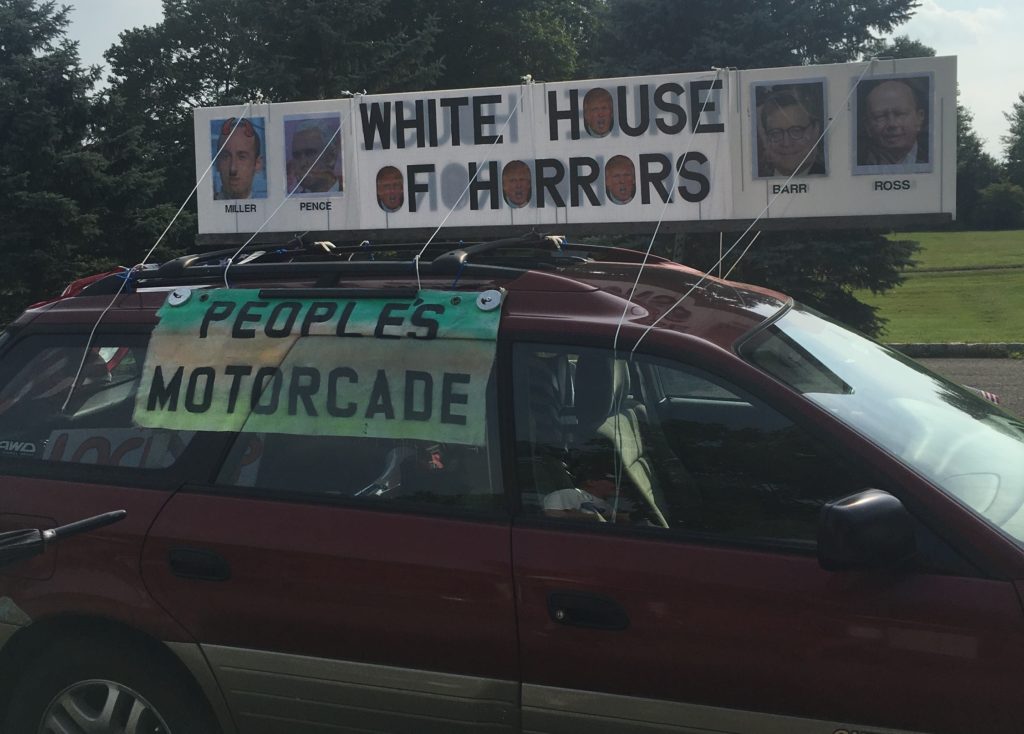Today's America is More Divided Than It Was in the Chaotic 1960s
Listen to audio version of this article

BEDMINSTER - Those driving along Route 206 late Friday afternoon could not have missed the word, "Racist," spelled out in big block letters on the side of the road.
This was outside the local library, but more tellingly, it was just down the road from Trump National Golf Course, site that evening of a presidential fundraiser.
Those of a certain age talk about how the 1960's were such a chaotic and divisive decade. That was when we saw sharp, emotional divides over Vietnam, rock and roll, drug use and even the length of hair. The
50th anniversary of the moon landing and the soon-to-be 50th anniversary of Woodstock help bring that era into contemporary focus.
But with all respect to the 1960's, the divide in the nation today seems more pronounced and perhaps even more destructive than it was then. This divide was crystallized a week or so ago by the
president's suggestion that four Democratic members of Congress - all women and minorities - return to where they came.
That is what prompted protesters to take to the "streets" last week in overbearingly unfriendly weather.
Of course, three of the four women criticized by the president were born in the United States, but logic never deters those yearning to make someone's race or ethnicity an issue.
Words to the effect of "go back to where you came from," are not new.
They've been part of American society for a very long time. A big difference these days is that the guy uttering them is not a drunk in a bar, but the president. Times change.
But to grasp today's political divide, you have to recognize how the nation seems split over such ignorance.
Many Trump defenders say the phrase is not racist.
It is true that the words, "go back to where you came from," in themselves contain no racial or ethnic slurs, but is that really the point? Not in the least.
The point is the president's suggestion that minority representatives with the temerity to disagree with him do not belong in the United States. That is a bigoted view even without racial epithets. Clearly.
He would have been unlikely to say the same about white political opponents whose ancestors came here five generations ago.
But there's something more here, and it does hearken back some 50 years.
A popular saying in those days was, "America, Love it or Leave it."
This was a mindless chant. But the suggestion was easy to follow - those who do not love America should simply leave it.
That was the president's main point. It was aimed, not just at four members of the House, but at the country at large.
And many in the country at large who like Donald Trump have contended over the last week or so that the four congresswoman in question do not support the United States or its aims.
On a very basic level, and leaving aside the accuracy of that observation, so what?
We live in a democracy, so no one is obligated to support, or even like, the United State. We have freedom of speech and thought. No rational person should want to live in a nation where patriotism is
compulsory.
But beyond that, let's draw the needed distinction between support of country and support of the president. They are two very different things.
The country is our constitution and democratic ideals, The president is the person running the government at the moment.
One can hate Donald Trump and love the United States.
Or in more benign terms, dislike Donald Trump and like the United States.
Unfortunately, there are some who don't seem able to respect the distinction between the president and the country. One of them is the president himself.
And with the president likely to continue offering his incendiary racial views, this divide is going to continue. And perhaps even escalate as the 2020 election gets closer every day.
A middle ground - a place for reasonable discourse - is not in sight.
And sure, extremists on both sides share the blame for that.
And there's no moon landing this summer to bring the nation together.





